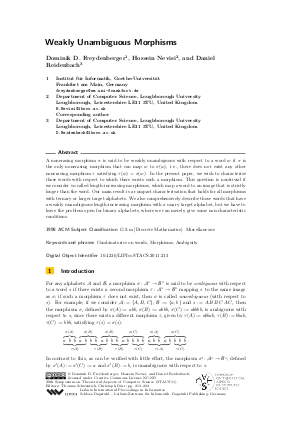Weakly Unambiguous Morphisms
Authors Dominik D. Freydenberger, Hossein Nevisi, Daniel Reidenbach
-
Part of:
Volume:
28th International Symposium on Theoretical Aspects of Computer Science (STACS 2011)
Part of: Series: Leibniz International Proceedings in Informatics (LIPIcs)
Part of: Conference: Symposium on Theoretical Aspects of Computer Science (STACS) - License:
 Creative Commons Attribution-NonCommercial-NoDerivs 3.0 Unported license
Creative Commons Attribution-NonCommercial-NoDerivs 3.0 Unported license
- Publication Date: 2011-03-11
File

PDF
LIPIcs.STACS.2011.213.pdf
- Filesize: 0.62 MB
- 12 pages
Document Identifiers
Subject Classification
Keywords
- Combinatorics on words
- Morphisms
- Ambiguity
Metrics
- Access Statistics
-
Total Accesses (updated on a weekly basis)
0Document
0Metadata
Abstract
A nonerasing morphism sigma is said to be weakly unambiguous with respect to a word w if sigma is the only nonerasing morphism that can map w to sigma(w), i.e., there does not exist any other nonerasing morphism tau satisfying tau(w) = sigma(w). In the present paper, we wish to characterise those words with respect to which there exists such a morphism. This question is nontrivial if we consider so-called length-increasing morphisms, which map a word to an image that is strictly longer than the word. Our main result is a compact characterisation that holds for all morphisms with ternary or larger target alphabets. We also comprehensively describe those words that have a weakly unambiguous length-increasing morphism with a unary target alphabet, but we have to leave the problem open for binary alphabets, where we can merely give some non-characteristic conditions.
Cite As Get BibTex
Dominik D. Freydenberger, Hossein Nevisi, and Daniel Reidenbach. Weakly Unambiguous Morphisms. In 28th International Symposium on Theoretical Aspects of Computer Science (STACS 2011). Leibniz International Proceedings in Informatics (LIPIcs), Volume 9, pp. 213-224, Schloss Dagstuhl – Leibniz-Zentrum für Informatik (2011)
https://doi.org/10.4230/LIPIcs.STACS.2011.213
BibTex
@InProceedings{freydenberger_et_al:LIPIcs.STACS.2011.213,
author = {Freydenberger, Dominik D. and Nevisi, Hossein and Reidenbach, Daniel},
title = {{Weakly Unambiguous Morphisms}},
booktitle = {28th International Symposium on Theoretical Aspects of Computer Science (STACS 2011)},
pages = {213--224},
series = {Leibniz International Proceedings in Informatics (LIPIcs)},
ISBN = {978-3-939897-25-5},
ISSN = {1868-8969},
year = {2011},
volume = {9},
editor = {Schwentick, Thomas and D\"{u}rr, Christoph},
publisher = {Schloss Dagstuhl -- Leibniz-Zentrum f{\"u}r Informatik},
address = {Dagstuhl, Germany},
URL = {https://drops.dagstuhl.de/entities/document/10.4230/LIPIcs.STACS.2011.213},
URN = {urn:nbn:de:0030-drops-30123},
doi = {10.4230/LIPIcs.STACS.2011.213},
annote = {Keywords: Combinatorics on words, Morphisms, Ambiguity}
}
